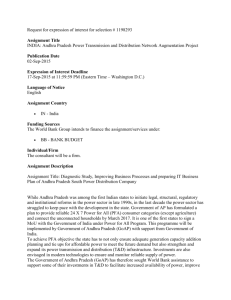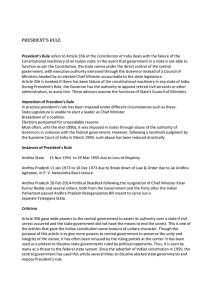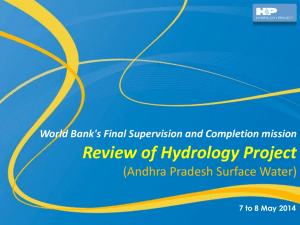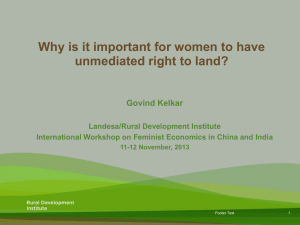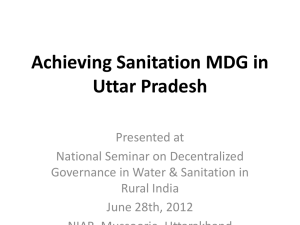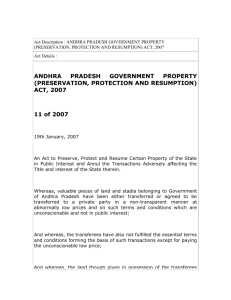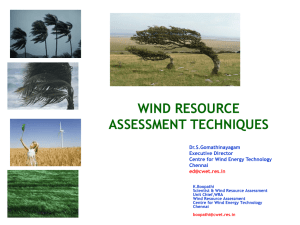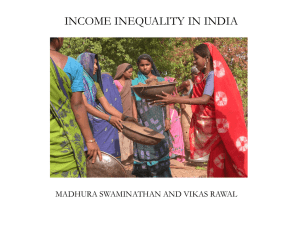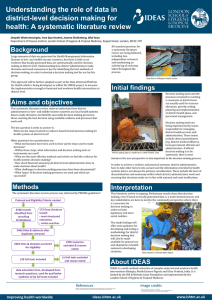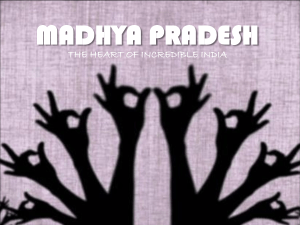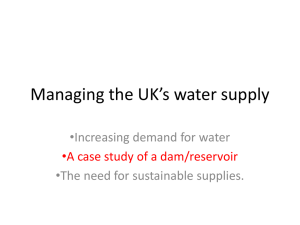Presentation
advertisement
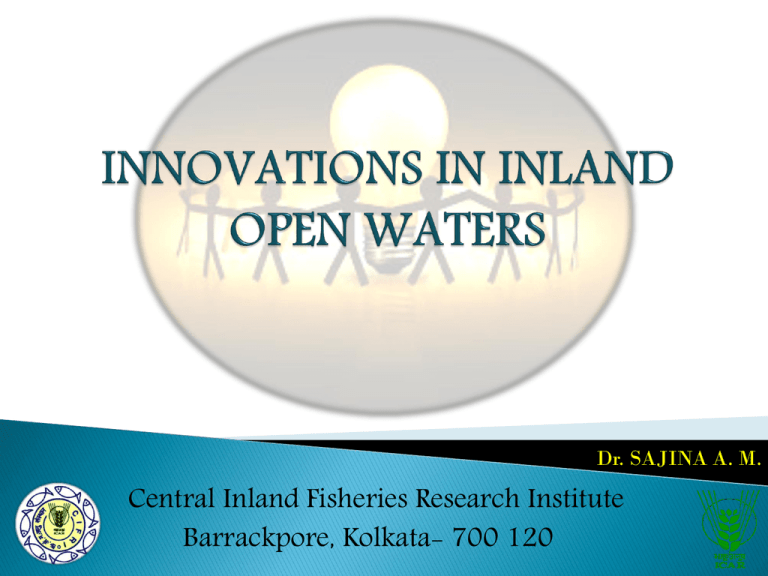
Dr. SAJINA A. M. Central Inland Fisheries Research Institute Barrackpore, Kolkata- 700 120 Inland open waters of Meghalaya ◦ Rivers & canals- 5,600 Km ◦ Reservoirs – 0.08 lakh ha ◦ Tanks & Ponds- 0.02 lakh ha ◦ Wetlands Issues & Challenges Need/Scope for Innovation Proper planning and development of fisheriesneed to assess and monitor inland water resources Issue- Scattered nature, Difficulty in accessibility, Declining water area Interventiontechnology employ for the assessment remote of the sensing fisheries resources and GIS for management of resources Standardised the methodology for estimating water spread area of inland fisheries resources and their production status using GIS tools in West Bengal and Uttar Pradesh Mapping of water bodies in Punjab, Haryana, Tamil Nadu, Andhra Pradesh and Chhattisgarh Preparation of electronic atlas for water bodies of >10 ha area in 6 States Kerala Karnataka, Maharashtra, West Bengal, Punjab, Haryana, Bihar Digital Elevation Model of catchments and streams were created for four water bodies of West Bengal and six water bodies of Uttar Pradesh Issues ◦ More demand and less supply of affordable protein by all ◦ Capture fisheries production- more or less stagnant Intervention- Production enhancement inland open water resources ◦ Stock enhancement/Ranching ◦ Pen culture ◦ Cage Farming from CIFRI providing technical assistance for the implementation of cage farming for table fish in 12 States under NMPS Andhra Pradesh Tamil Nadu Karnataka Madhya Pradesh Orissa Bihar Jharkhand Uttar Pradesh Himachal Pradesh Technology for carp seed raising in cages have been developed; 150-210 no. of fish fingerlings (80-100 mm) can be produced per cubic meter of the cage at a cost of Rs 0.4/fingerling with a cost benefit ratio of 2.5 to 2.7 Issue-Overexploitation, Juvenile fishing, Destructive fishing, Habitat alteration Intervention- Captive breeding and culture Hilsa (T.ilisha)- New Programme for breeding, seed production culture under NFBSFARA and Issue- Changes in temperature and rainfall pattern affecting the biological cycle of fishes InterventionHarnessing the beneficial effects of climate change Indian major carps Labeo rohita, Catla catla and Cirrhinus mrigala of six states viz. West Bengal, Assam, Tripura, Andhra Pradesh, Madhya Pradesh and Uttar Pradesh Schizothorax richardsonii, Onchorhynchus mykiss and Tor putitora in Uttarakhand Three coldwater fishes Two estuarine fishes T. ilisha and Liza parsia in Hooghly Matlah estuarine system Study was hatcheries conducted of Andhra in fish Pradesh, Madhya Pradesh, Uttar Pradesh, West Bengal, Assam and Tripura. Hatcheries of N-24 Parganas, W. B. - Reproductive maturity of IMC has advanced by nearly one month (from April to March) and the duration of spawning has extended by one month (from July to August) The breeding of rainbow trout record an advancement of gonadal maturity as early as January in the high altitude of Uttarakhand. The IMC Labeo rohita presently is surviving and growing in the pond waters of Uttarakhand hills. Issue- Due to heavy pollution load, many Indian rivers are losing or have lost their self-purification ability and are now septic with toxic and/or oxygen scavenging pollutants Intervention- Development of environment mitigation protocols through microbiological biotechnological interventions and • 17 phenol/ chlorophenol degrading bacteria were isolated from Churni, Hooghly and Damodar rivers • More than 150 bacteria have been isolated from different aquatic habitats for arsenic transformations; four strains having Arsenic reduction capability have been isolated and proven their roles in arsenic reduction and mobilization • • Six bacterial strains, capable of releasing phosphorous from calcium bound phosphate, were isolated from wetland sediments In process- Microbiological formulations for organic pollution degradation in aquatic environment Rapid field bio-assessment approach for addressing cumulative and / or synergistic impact of anthropogenic stressors on inland aquatic ecosystem Fish based Index of Biotic Integrity (IBI), Health assessment Index (HAI), Habitat suitability index (HSI) Capable of providing early warning signals for environmental degradation Issue- transformation of river ecosystems by fragmenting channels and altering river flows for hydropower generation and other purposes. Intervention- To estimate the requirement of minimum environmental flow in the river for sustainable fishery Various methods - Tennant method, Huges & Munster method and Building block method North east- Nyamjang Chhu river of Arunachal Pradesh ◦ Minimum water release of 3.5 cumecs from the barrage will maintain conducive depth and flow velocity of 0.55 m and 0.36 m/s respectively An efficient and useful method to systematically describe ecosystems and to explore their properties Provide valuable information on the health of reservoir habitats, as well as the capacity to support biological production and sustainable development Software- Ecopath, Ecosim Wyra reservoir, Andhra Pradesh ◦ First attempt in India on modelling a tropical productive reservoir ◦ To assess the impact of environmental management measures (implementation of fishing ban) taken to conserve the fish stocks in the reservoir ◦ Mass-balanced models of reservoir ecosystem were constructed for two periods, for 1995–1996 (pre-ban) and 2002–2003 (post – ban) using Ecopath ◦ The ecosystem indices indicate that the reservoir during post-ban phase was in a more resilient state (resistant to perturbations) compared to the pre-ban phase ◦ The ban was found to be useful in conserving the most prized prawn, Macrobrachium malcolmsonii in the reservoir Kelavarapalli reservoir, Tamil Nadu ◦ First attempt in India to assess the impact of invasive fishes on the reservoir ecosystem through ecosystembased approach ◦ Interesting observation in this study is that the most dominant invasive fish in this reservoir (Nile Tilapia) does not negatively impact any of the fish groups ◦ African Catfish - exerts a direct negative impact on its preys–indigenous catfishes, Pearl spot and Tilapia Current data from the reservoir confirms the accuracy of the prediction from the model and Coimbatore District Collector issued orders banning culture and marketing of African catfish Karapuzha reservoir, Kerala ◦ Prey-predator interactions revealed that the major carps do not negatively impact the local fish species in the reservoir Based on the results of this study, the Kerala Government decided to proceed with stocking of fishes in reservoirs of Kerala Issues ◦ Inland open multifunctional water resources are complex and ◦ The decisions on sub-optimal or irrational use of inland waters are often taken due to lack of availability of information on goods and services provided by them and their actual value Intervention-Concept of estimation of the actual monetary value of the goods and services comprising the ecological, economic and social aspects. Purpose-To ensure conservation
